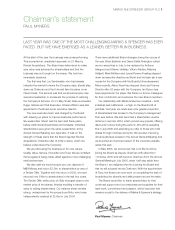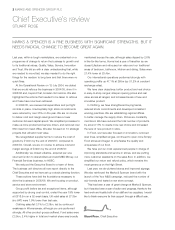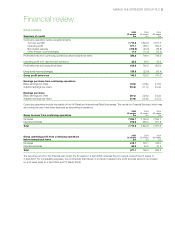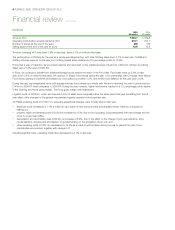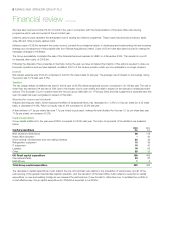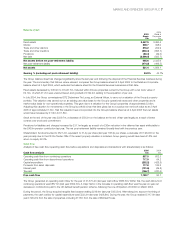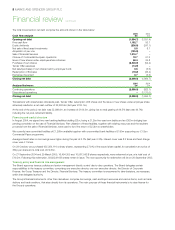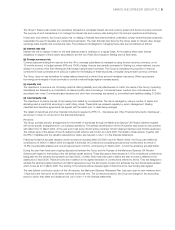Marks and Spencer 2005 Annual Report Download - page 13
Download and view the complete annual report
Please find page 13 of the 2005 Marks and Spencer annual report below. You can navigate through the pages in the report by either clicking on the pages listed below, or by using the keyword search tool below to find specific information within the annual report.
MARKS AND SPENCER GROUP PLC 11
Corporate governance
The Board is committed to high standards of corporate
governance and supports the Combined Code on Corporate
Governance (the ‘Code’), published in July 2003. The following
statement is intended to explain our governance policies and
practices and to provide insight into how the Board and
management run the business for the benefit of shareholders.
A detailed account of how we comply with the Code provisions
can be found on the Corporate Governance section of the
Company’s website, together with the terms of reference of
the audit, remuneration and nomination committees, at
www.marksandspencer.com/investorrelations.
The Board
On 23 May 2005 the Board comprised the Chairman, Chief
Executive, one executive director and four non-executive directors,
who are collectively responsible for the success of the Company.
On 27 June 2005 our new Finance Director will join the Board.
A list of directors, with details of their biographies and committee
membership, is given on page 17 of the Annual Review.
Paul Myners is Chairman and he is responsible for the working
of the Board, for the balance of its membership subject to Board
and shareholder approval, and for ensuring that all directors are
enabled to play their full part in its activities to deliver value to
shareholders. He ensures effective communication with
shareholders and makes sure that Board members develop an
understanding of the views of major investors.
Stuart Rose is Chief Executive and he is responsible for all aspects
of the management of the Group and its business, which includes
developing the appropriate business strategy for Board approval
and securing its timely and effective implementation. He ensures
that, within the strategies agreed by the Board, appropriate
objectives and policies are adopted for each of the businesses
of the Company, that appropriate budgets are set for them
individually, that their performance is effectively monitored and
that guidance or direction is given where appropriate.
The Chairman ensures that the directors receive accurate, timely
and clear information. Directors are encouraged to update their
skills, knowledge and familiarity with the Group through their initial
induction, ongoing participation at Board and committee meetings,
and through meeting our people at store locations and elsewhere.
Views of customers and shareholders are also shared through
Board presentations and individual meetings. The Board is
regularly updated on governance and regulatory matters. There is
an established procedure whereby any director, wishing to do so in
the furtherance of their duties, may take independent professional
advice through the Group Secretary at the Company’s expense.
This has been extended to the audit, remuneration and nomination
committees to take their own independent advice.
Kevin Lomax is Senior Independent Director and he provides a
communication channel between the Chairman and the non-
executive directors and to ensure that the views of each non-
executive director are given due consideration. He is also an
additional contact point for shareholders if they have reason for
concern which contact through the normal channels of Chairman,
Chief Executive or Finance Director has failed to resolve or for
which contact is inappropriate. Brian Baldock was the Senior
Independent Director until his retirement on 14 July 2004.
The non-executive directors provide a wide range of skills and
experience to the Group. They bring an independent judgement
on issues of strategy, performance, risk and people through their
contribution at Board and committee meetings. The Board
considers that throughout the year each non-executive director
was independent in character and judgement and that they also
met the independence criteria set out in the Code. The non-
executive directors have ensured that they have sufficient time to
carry out their duties. They are expected to serve two three-year
terms, although the Board may invite them to serve an additional
period. As a consequence of changes to the Board described in
the Directors’ report on page 27, less than half the Board were
independent non-executive directors for the period from 31 May
to 9 November 2004.
Graham Oakley, Group Secretary, acts as a sounding board to the
Chairman and individual directors. He plays a key role for the
Chairman in ensuring the effective functioning of the Board. He is
secretary of the audit, remuneration and nomination committees.
He also heads the Corporate Governance Group, which supports
the Board and its committees and commercial colleagues on a
wide range of issues.
The Board has a formal schedule of matters reserved for its
decision. It determines the overall Group strategy; creation,
acquisition or disposal of material corporate entities or assets;
development and protection of the brand; matters of public interest
that could affect the Group’s reputation; public announcements
including statutory accounts; significant changes in accounting
policy; capital structure and dividend policy; operating plans and
key performance indicators; prosecution, defence or settlement of
material litigation; Group remuneration policy and Board structure,
composition and succession.
The Board receives regular updates on performance against the
annual operating plan and investment decisions, together with
business reports and presentations from senior management.
During 2004/05 we reviewed all expenditure and put tight controls
in place. Stock commitments were reduced by over 35% year on
year. We are on course to deliver cost and margin savings and
have a lower customer-focused capital spend. We simplified
processes to make us more product and service driven, and
removed 650 roles from head office. We also focused on 10
strategic projects that will add most value.
We renegotiated supplier terms to reduce the cost of goods by
£140m by the end of 2006/07 compared to 2003/04. Overall, we
expect to achieve cost and margin savings of £320m by the end
of 2006/07. Additionally, we closed Lifestore, acquired per una,
returned £2.3bn to shareholders and sold M&S Money to HSBC.
We reduced the Executive Board to a team of three. The Business
Unit Directors all now report directly to the Chief Executive and
give regular presentations to the Board on strategies in their
relevant areas of the business.
The Board delegates to management, through the Chief Executive,
the overall performance of the Group which is conducted
principally through the setting of clear objectives and effective
performance coaching, building long-term management capability
and ensuring that the business is managed in a fit and proper
manner in keeping with its values and business principles.


